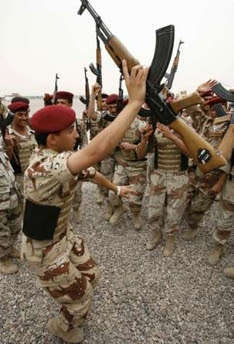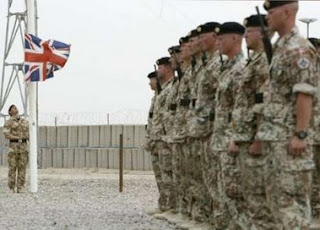Haider Ajina sends the following from Aswat Al-Iraq or “Voices of Iraq” from Apr 26, 2007:
——————————————————————
Al-Shuaiba airbase back to Iraqis for second time in 48 years
By Malik Saadon 
Iraqi soldiers celebrate during a handover ceremony at Al-Shuaiba military base to Iraqi forces in Basra April 24, 2007. (REUTERS/Atef Hassan)
Basra, Apr 26, (VOI) – Forty-eight years has passed between the handover of al-Shuaiba airbase from the British forces to the Iraqi Air Force (IQAF) in 1959 and its handover to the 10th division of the Iraqi army two days ago. During these 48 years the map of the world has changed, many concepts, ideas and theories have evolved, disproving others that scientists previously held true, but man’s will to remain free and to be the master of his own land has not changed.
The British forces on Tuesday handed over al-Shuaiba airbase, 40 km from western Basra, to the 10th division of the Iraqi army, after it having been a vital airbase for the British and Danish forces since 2003. A military parade was held during which the Iraqi flag was raised and the British and Danish flags were lowered in reference to the return of Iraqi sovereignty.
With the handover of al-Shuaiba airbase, the presence of the multi-national forces will be confined to two bases: the presidential palaces in central Basra, 550 km south of Baghdad, and Basra International Airport in the northwest of the city.
Al-Shuaiba airbase was first used by the British forces on March 9, 1915 after they won their battle against the Ottoman Turks in World War I, as part of what the British forces called ‘The Mesopotamian campaign,’ which means the campaign between the two rivers, referring to the Euphrates and the Tigris rivers.
“On November 6, 1914, the first British battalion of the 16th legion landed on Fao beach, raised the British flag and lowered the flag of the Ottoman Empire,” Ali Jabir, a retired brigadier, told the independent news agency Voices of Iraq (VOI).
“Under the command of Sir A. Bart, the British forces on November 23, 1914 managed to occupy Basra and staged a military parade, to which foreign consuls and prominent figures from Basra were invited, to celebrate what they called ‘the liberation of Iraq’ from the despotism of the Ottoman Empire,” Jabir continued.
Explaining the strong reactions to the British occupation of Basra, Jabir said that the situation turned upside down as soon as the occupying forces held sway.
Danish soldiers stand at attention as a British soldier lowers his national flag during a hand over ceremony of Al-Shuaiba military camp to Iraqi forces in Basra April 24, 2007. (REUTERS/Atef Hassan)“Despite serious conflicts at that time between the southern Iraqi tribes and the Ottoman government, which local residents considered their main enemy before the occupation, religious groups in Najaf called for fighting the new occupying forces,” Jabir said. Muhammad Saeed al-Habobi, a well-known love poet in Najaf, was one of the Iraqi men of religion who called on people to join al-Shuaiba Battle, where the British forces were on the verge of defeat had it not been for their intrigue. According to Jabir, al-Habobi could not bear the shock of the defeat. “He fell severely ill and was bedridden until he died in Nassiriya on June 16, 1915.”
After holding sway over all Iraqi provinces, the British forces started to build stable bases, among which was al-Shuaiba base. “In 1920, the Royal Air Force (RAF) set up a camp at al-Shuaiba where it deployed the 84th company, which was replaced in 1940 by the 244th company that fought the anti-colonial Rashid Ali al-Kilani Movement in World War II,” a British media source, who spoke on condition of anonymity, told the independent news agency Voices of Iraq (VOI).
“Our backs were bleeding severely under the scourge of the feudal system in Missan’s rural areas. We could not afford to pay rent to the landlord of the land. My two brothers and I considered leaving and chose Basra as our destination. We arrived there after a five-day journey on foot,” Hajj Hassan, one of the workers at al-Shuaiba base during the British occupation in the 1930s, who is now over 90-years old, told VOI.
“We were lucky that we were chosen by al-Karka, the Indian soldiers in the British army, otherwise known then as the Indian cavalry. They took us to a camp in the heart of the desert called al-Shuaiba. We worked there for several years: my brothers worked in construction and in the transportation of iron and I worked as a supervisor because of my ability to read and write,” Hassan recounted.
“We were paid 14 rupees per week. A rupee is the standard unit of money in India, which was then equal to 60 Iraqi fils (1 Iraqi dinar = 1000 fils),” Jabir explained.
For more than three decades Basra’s al-Shuaiba remained one of the most vital bases for the British forces in Iraq. After the July 14, 1958 Revolution, which put an end to the royal reign and declared Iraq a republic, al-Shuaiba airbase was handed over to the IQAF in 1959.
“In fact, al-Shuaiba airbase remained in service until the second Gulf War in 1991. It was heavily bombarded on January 17, the first day of the U.S.-led war against Iraq in the aftermath of the Kuwait invasion,” Colonel Muhammad Saeed al-Mudhafar told VOI.
“Afterwards an air blockade was imposed by the United States on southern and northern Iraq,” al-Mudhafar continued.
“After the U.S. invasion of Iraq in March 2003, al-Shuaiba airbase was reestablished as a base for supplying the British forces. It turned into a vital and busy military base with more than 8,000 soldiers from 13 countries, including Britain, Denmark, Japan, the Czech Republic, Italy, The Netherlands, Bosnia, Spain, Estonia, Ukraine, Romania and the United States,” al-Mudhafar said.
“In February 2006, the British forces decided to transfer their troops from al-Shuaiba base to the Basra International Airport,” he added.
In March and April 2007, two British bases were handed over to the 10th division of the Iraqi army. The first base was in downtown’s al-Saie neighborhood and the second was in Shatt al-Arab Hotel in northern Basra.
Haider Ajina comments:
The above shows a slice of history about southern Iraq since WW1. As is evident from this hand over, Basra is gradually and surely heading towards taking over its own affairs. Basra province with its provincial capita Basra is Iraq’s second largest population concentration and includes Iraq’s second largest city. Basra province is 7,363 sq mi and has population of 2.6 million. This represents almost 10% of the population of Iraq and 4.5% of Iraq’s territory. Basra is oil rich and home to Iraq’s sea port.
As to operation ‘Rule of Law’, ‘Fardh al-Qanoon’ or what we know as the ‘Surge’. The spokes person for the Iraqi commander of the operation, Gener
al Musawi, stated that security in the capital Baghdad has improved substantially. Sectarian killing have been substantially reduced and bombing have declined measurable. He said “Before the commencement of the Fardh al-Qanoon plan, gunmen used to launch between 15 to 18 attacks every day, but now these attacks reached seven as maximum, the matter considered as a success to the security plan,”. The boroughs in Baghdad of Al-Kargh, Al-Ghzaliah and Al-Yarmook are now in phase two of the operation. Phase one of operation ‘Rule of Law’ is purging boroughs from terrorists or out laws. Phase two is securing borough with portable barriers. Phase three is holding the ground and providing services to the residents. Phase four is returning those families who have fled. The last phase, phase five is turning over the security to the interior ministry.
Regards,
Haider Ajina

